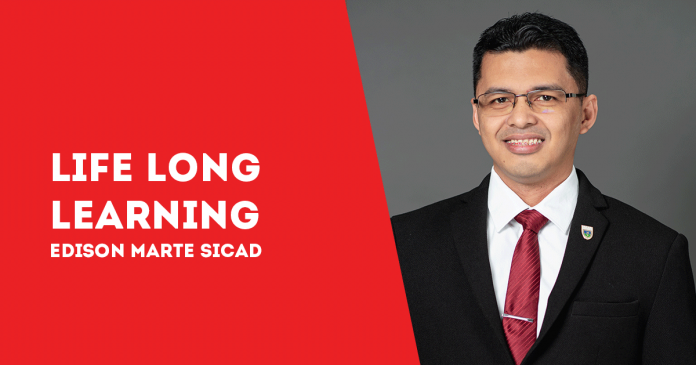
BY EDISON MARTE SICAD
“Here’s to the crazy ones. The misfits. The rebels. The troublemakers. The round pegs in the square holes. The ones who see things differently. They’re not fond of rules. And they have no respect for the status quo. You can quote them, disagree with them, glorify or vilify them. About the only thing you can’t do is ignore them. Because they change things. They push the human race forward. And while some may see them as the crazy ones, we see genius. Because the people who are crazy enough to think they can change the world, are the ones who do.” – STEVE JOBS
TO SOME of us grown-ups, to change for the better — or to decide to aim for the best — which requires a change of mindset and of lifestyle, is next to impossible, if not totally absurd.
We somehow know what to do, but we don’t do them for some valid reasons—or excuses.
But the question is, Why change? Why rock the boat and plunge yourself into discomfort? Why trade your peace of mind with mental stress?
When I was still teaching, I would tell my students that the world can offer them anything they want. If they want to live the most problematic life, the world is full of catastrophes and bad influencers. They can waste their time with peers and parties and all the pleasures known to man.
On the other hand, if they want to be the best, if they are aiming to realize their utmost potential, the world also has people and places that can nurture and cultivate greatness.
In other words, if you want to be (more) depressed or inspired, the world can give you either — or both.
I have changed. Well, I have changed my career path — or I could have just returned to the original path.
My work-experience as a legal researcher rekindled my ambition of joining the legal profession. And the book of Dr. Wayne Dyer entitled Pulling Your Own Strings has taught me many things to fulfill this ambition.
Allow me to share these three sentences from his book:
1. “Your hurts come not from what others do to you, but from what you choose to do with their actions.”
Is it normal to get irritated due to other people’s behavior?
This statement of the author is related to Stephen Covey’s advice, which is to be proactive rather than reactive. In my case, the only way for me to be proactive is by having a big enough goal that will guide me as to what to prioritize and where to focus on.
A deep sense of understanding other people and a high respect to one’s own goals and dreams: with this perspective, I hope I can successfully manage my daily interactions.
2. “The conflict originates when you expect the world to be the way you want it to be and find yourself upset because things aren’t going the way you want them to go, or as they used to go, or even worse, as you insist that they go.”
This statement helped me a lot in staying calm in moments of utter exasperation. I would especially use this advice when I am driving. I realized that the behavior of a driver is dependent on why he is driving. I cannot expect that drivers of jeepneys, buses, tricycles, and motorcycles should behave the way I behave. I do not worry about passengers and boundaries, rain and heat, and competing with other drivers for passengers.
I do not drive as work. I drive to work—sometimes just for leisure. I admit that there are drivers of private cars who are also a pain in the neck. And now, I consider it as an achievement when I am able to drive with comfort, peace of mind, and a steady heartbeat.
There is reality that is brought by people’s behavior, which we can just observe and accept and not worth the bother. There is also reality (the making of it) within our own control, an opportunity in taking charge of our own lives.
3. “If you persevere and follow up tirelessly, never even entertaining the idea of being put off, then you will almost always emerge not only having reached your goals, but often having far exceeded your initial expectations.”
As David Goggins would say, “The purpose is You.” Although we do get inspired in doing better to be able to reach a goal, Goggins believed that the real purpose is oneself. The ultimate goal is self-actualization: so simple and profound an idea.
I pity the youth of today whose lives have been entangled with social media. I am also worried that some adults measure their worth based primarily on social media results.
On the bright side, there are people who utilized social media without leading one into screentime addiction, but rather towards personal growth and discipline.
To pull your own strings is freedom from self-defeating behavior. For some reasons, some of us have settled into a life of normalcy, while there are those who have chosen to live and fight for greatness, the best expression of self-love.
What do we do for the things we love?
We trade sleep, peace and even our mind.
Sacrifice, devotion, we give them our life.
We give hours and hours, work day and night.
Tireless exertion, the lows and the highs.
Blood, sweat, tears, pain, everything, anything,
all that we can and all that we could.
Why?
Because we do anything for the thing that we love.
— William Mulligan/PN



